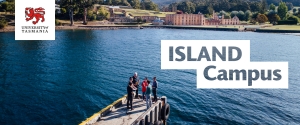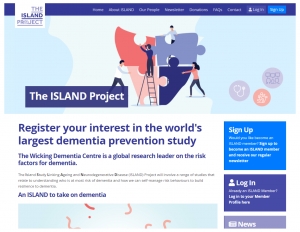
Welcome to this special edition of the ISLAND Project newsletter. It's an exciting and busy time for the ISLAND Project. ISLAND Campus was recently launched - a new study designed to encourage Tasmanians aged 50 and older to access university education in a bid to improve brain health and reduce the risk of dementia. You are invited to take a look at this opportunity to undertake a course or degree program at the University of Tasmania, with no tuition fees, and to be part of our research. Since the ISLAND Project was launched a year ago, we now have more than 10,000 Tasmanians aged over 50 interested in shifting their risk of developing dementia. Past editions of our newsletter have explained the benefits of formal education for brain health and introduced to you the findings of our Tasmanian Healthy Brain Project. Through this project, our researchers have established that older adults who engage in university education gain a cognitive benefit that may help to provide resilience to dementia. ISLAND Campus will build on this research and we invite you to be part of this exciting initiative. In return for participating in this study, you can access a selection of university courses and degree programs at no financial cost, for study commencing in July this year or semester one 2021. You will find further information at the ISLAND Campus website and we will be holding webinar sessions to present ISLAND Campus to you and to answer questions that you can submit to island@dementia.utas.edu.au. Webinar session times are advertised in this newsletter, see below. ISLAND continues to lead the way in dementia prevention research and we are so pleased that you are joining us on this journey.
|

The ISLAND Campus research initiative is based upon a decade of research with the Wicking’s Tasmanian Healthy Brain Project (THBP). This long-term project, begun in 2010, is investigating the potential of university-level education to reduce an individual’s risk of dementia. Recent results suggest that later-life education may protect against dementia, making the ISLAND Campus study an exciting endeavour! Research indicates that engagement in early/mid-life education, career attainment and intellectually stimulating activities can reduce your risk of dementia. We know that the more you learn in early-life, the less risk of dementia you will have in later-life, but why is this the case? A growing body of research suggests the protective effect of education may be due to building your brain’s resilience to physical changes in brain ageing, a concept known as ‘cognitive reserve’. By taking part in intellectually stimulating activities, you are reinforcing your brain’s ability to cope with the biological changes that precede dementia. This theory suggests that taking part in education builds your cognitive reserve, thereby reducing your risk of dementia. Wicking’s THBP was established in 2010 to investigate whether this theory held true for later-life education. Researchers offered 500 Tasmanians aged 50-79 years the opportunity to enrol in subsidised university-level education at the University of Tasmania. All THBP participants were followed up every year, with comprehensive tests on their cognition, lifestyle, social, physical, well-being and medical status. Now in 2020, Wicking researchers are interested in the cognitive function of those who did and didn’t choose to undertake university-level education. Results indicate that people who undertook later-life education had improved cognitive function compared to those that didn’t. From all the cognitive domains, participant’s verbal and language memory showed the greatest improvement. In this world-first study, participants that enrolled in university-level education experienced a cognitive benefit, suggesting that later-life education may enhance an individual’s cognitive reserve and therefore reduce their risk of dementia. ISLAND Campus builds upon this knowledge base by offering, for the first time, free university tuition to all ISLAND members (over 10,000 Tasmanians and counting). We know that early-life education can reduce your risk of dementia and we now know, with evidence from the THBP, that participating in later-life education can build your cognitive resilience to brain ageing and reduce your dementia risk. ISLAND Campus is the next step in this initiative, representing another world-first in a population that resembles the entire Tasmanian population over 50 years of age.
|

Not yet an ISLAND member?
If you haven't signed up to our research program, it's easy and takes just a few minutes. Our website, ISLAND Home, is where you will find access to our research surveys and activities, including ISLAND Campus. By becoming an ISLAND member you will be kept informed of information and opportunities to help you reduce your risk of developing dementia and to be part of our combined efforts to reduce the incidence of dementia in Tasmania. Go to our website and sign up, or if you have enrolled in any of our MOOC's, go to the log in link and sign in with your existing credentials.
|

Are you a carer of someone living with dementia?
Researchers at the Wicking Dementia Research and Education Centre are seeking carers of people living with dementia to participate in a new research study, the Rested Project. The aim of the project is to investigate whether carer's stress can be reduced by providing dementia education and engagement in a course. Researchers are also interested in whether participation in dementia education can lead to improved quality of life for dementia carers and people with dementia for whom they care. If you would like to find out more, contact the research team at rested.project@utas.edu.au or at this website. Rested Project
|